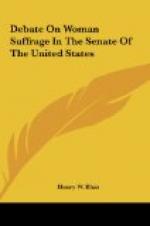That same mother will attend church at least forty times yearly on the average from her cradle to her grave, beside an infinity of other social, religious, and industrial obligations which she performs and assumes to perform because she is a married woman and a mother rather than for any other reason whatever. Yet it is proposed to deprive women—yes, all women alike—of an inestimable privilege and the chief power which can be exercised by any free individual in the state for the reason that on any given day of election not more than one woman in twenty of voting age will probably not be able to reach the polls. It does seem probable that on these interesting occasions if the husband and wife disagree in politics they could arrange a pair, and the probability is, that arrangement failing, one could be consummated with some other lady in like fortunate circumstances, of opposite political opinions. More men are kept from the polls by drunkenness, or, being at the polls, vote under the influence of strong drink, to the reproach and destruction of our free institutions, and who, if woman could and did vote, would cast the ballot of sobriety, good order, and reform under her holy influences, than all those who would be kept from any given election by the necessary engagements of mothers at home.
When one thinks of the innumerable and trifling causes which keep many of the best of men and strongest opponents of woman suffrage from the polls upon important occasions it is difficult to be tolerant of the objection that woman by reason of motherhood has no time to vote. Why, sir, the greater exposure of man to the casualties of life actually disables him in such way as to make it physically impossible for him to exercise the franchise more frequently than is the case with women, including mothers and all. And if this liability to lose the opportunity to exercise the right once or possibly twice in a lifetime is a reason that women should not he allowed to vote at all, why should men not be disfranchised also by the same rule?
But it is urged that woman does not desire the privilege. If the right exist at all it is an individual right, and not one which belongs to a class or to the sex as such. Yet men tell us that they will vote the suffrage to women whenever the majority of women desire it. Are, then, our rights the property of the majority of a disfranchised class to which we may chance to belong? What would we say if it were seriously proposed to recall the suffrage from all colored or from all white men because a majority of either class should decline or for any cause fail to vote? I know that it is said that the suffrage is a privilege to be extended by those who have it to those who have it not. But the matter of right, of moral right, to the franchise does not depend upon the indifference of those who possess it or of those who do not possess it to the desire of those women who desire to enjoy their right and to discharge their




